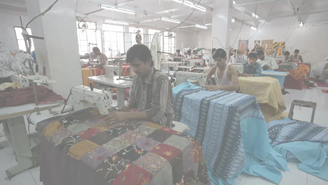Antimicrobial Resistance: A life-threatening issue
Since their introduction, antibiotics have saved millions of lives by reducing complications and mortality associated with infectious diseases. However, widespread use of antimicrobial drugs is also closely associated with an increase of antimicrobial resistance (AMR). As the makers of these drugs, pharmaceutical companies can play a big role in battling AMR. Without their efforts, the prospects for successfully combating the issue are dim.
Migrant Detention at US Borders: What investors need to know
Over a five-week period in May and June 2018, 2,342 immigrant children were forcibly separated from their families at detention centers along US borders[1]. This was the result of the Trump administration’s “zero tolerance” policy of referring for criminal prosecution people who cross the border illegally, including asylum seekers. This policy and the resulting family separation have been criticized as unconscionable and damaging by the United Nations high commissioner for human rights, as well as by the American Association of Pediatrics.
Blockchain-enabled proxy voting on the horizon
While blockchain technology is popularly associated with cryptocurrencies such as Bitcoin, its inherent use case lies in its capacity to maintain registries that are at once speedy, secure, transparent, coherent and reliable. As a result, new solutions have either been proposed, or are being developed, for such disparate areas as land registries, insurance, financial products, healthcare records, and smart appliances. Many of these fields are currently overseen by government bureaucracies or other third-parties, with comparatively sluggish manual input occurring for such mundane tasks as data entry, data retrieval, and user verification. Theoretically, blockchain-enabled “smart contracts” would allow these clerical tasks to be accomplished in a fraction of the time.
Celebrating a diversity of approaches to sustainable investing
I recently traveled from the US to Europe to learn about the major market differences in sustainable investing. For context, investors long rooted in sustainable investing practices have viewed the general US market as lagging compared to Europe. As it pertains to values-based investing, I agree. However, the US has embraced ESG integration in a very sophisticated and pioneering way as it relates to risk mitigation.
Revisiting ESG in China: Has company performance improved?
China’s growing economic power, continuous reforms and liberalizations have made it increasingly important to global capital markets. In 2017, MSCI announced it would add around 230 “A-Shares” to its Emerging Markets and All Country World Index indices in June and September 2018. Due to the large amount of passive-strategy funds worldwide, it is estimated that a total of USD 20 billion, and as much as USD 300 billion at full inclusion, will flow into A-Shares market.
Regulating the Chemicals Industry: How does REACH impact Companies?
Chemical substances are part of our daily lives. They are found everywhere from the cleaning detergents we use to the clothes we wear and our personal electronics. The companies that produce these chemicals, some of which can be hazardous and have a negative impact on human health and the environment, are exposed to several risks and are highly regulated. In Europe, the Registration, Evaluation, Authorisation and Restriction of Chemicals (REACH) regulation focuses on ensuring the safe use of chemicals, as well as the phasing-out of the most harmful chemical substances. As the third and final REACH registration deadline approaches, we take this opportunity to look at the impact of chemical regulations on the sector and investors.
GDPR and the Right to Privacy
On May 25, 2018, General Data Protection Regulation (GDPR) will enter into force, repealing the 1995 non-legally binding European Union (EU) Data Protection Directive. GDPR enhances European citizens’ right to privacy by enshrining the “right to be forgotten,” establishing concepts like “privacy by design” and by setting aggressive timelines for businesses to report data breaches.
Pipeline Power Play: Kinder Morgan puts the Trans Mountain Expansion on Hold
On April 8th, Kinder Morgan (NYSE: KMI) and its Canadian subsidiary announced a suspension of work on its Trans Mountain Expansion pipeline (TME) until May 31 as resistance to the project comes to a head. The project, which would carry to market the glut of oil sands production in Alberta, is one of the few proposed pipeline megaprojects in Canada that remains underway. Despite this setback, the delay may not have a long-term negative impact on shareholder value. In our view, the suspension is not a capitulation but an ultimatum to push the Canadian government and the province of British Columbia (BC) to provide regulatory certainty for the project.
Commentary on New Department of Labor Guidance
On April 24th, the US Department of Labor (DOL) released a Field Assistance Bulletin (FAB), seeking to clarify how environmental, social and corporate governance (ESG) factors should be considered under the Employee Retirement Income Security Act (ERISA).
ESG in Australian Banking: A look at the Royal Commission Inquiry
The ongoing Government-appointed Royal Commission inquiry into misconduct in the banking and financial sector has put Australian financial institutions at the centre of a storm of public outrage, media attention and investor concern. Daily headlines are revealing a litany of wrongdoing and raising questions about what went wrong, and the reforms needed to fix it.
Moving the Fashion Industry Forward: Regulations and Industry Tools
Five years ago, the world was awakened to the reality of garment manufacturing conditions in Asia, and specifically in Bangladesh. The production of clothes for the developed markets was posing life-threatening hazards for Bangladeshi garment workers. The Rana Plaza factory collapse, which killed 1,100 people and severely injured 2,000, raised awareness among industry organizations, governments, investors and the public about fundamental human rights issues as well as poor working conditions in the region.
Battle over Western Sahara is moving into court rooms
Polisario Front, recognised by the United Nations as the legitimate representative of the people of Western Sahara (WS), announced that it will initiate new legal proceedings before EU Courts. The announcement came after the EU Council authorized the EU Commission to negotiate with Morocco for a new fisheries protocol. Interestingly, the EU council said that that the fishing agreement negotiations will also cover WS, a former Spanish colony which was annexed by Morocco in 1975.
Earth Day 2018: Rethinking Plastic Globally
Earth Day 2018 is focused on ending plastic pollution and “fundamentally changing human attitude and behavior about plastics.” Although more work is needed, some positive change is already happening. In this blog article, we examine some of the impacts of plastic pollution on our oceans, the regulatory and industry developments being implemented to curb it, and the role investors can play to reduce plastic ocean waste.
Facebook’s New Era: The Regulatory Implications of the Cambridge Analytica Incident
The collection and monetization of users’ data is a core part of Facebook’s strategy. However, Cambridge Analytica’s (CA) unauthorized collection and exploitation of this data exposes both the breadth and complexity of the information it has on individuals as well as the insidious nature of the methods used to collect it.
Transition Risk for Oil & Gas Companies: Addressing the Disclosure Gap
As the world transitions towards a low-carbon economy, investors are increasingly interested in how oil and gas companies plan to address related risks. Most companies in the industry recognize that their business is exposed to risks related to carbon regulations, decreasing demand for its products, or increasing costs related to the implementation of emission reduction technologies. However, when it comes to addressing these risks, disclosure is limited (as we noted in our July 2017 blog post on the Task Force for Climate-Related Financial Disclosures [TCFD]). Oil and gas companies will have to increase and improve their disclosure if they want to convince investors of the viability of their business model in a carbon-constrained world.



















